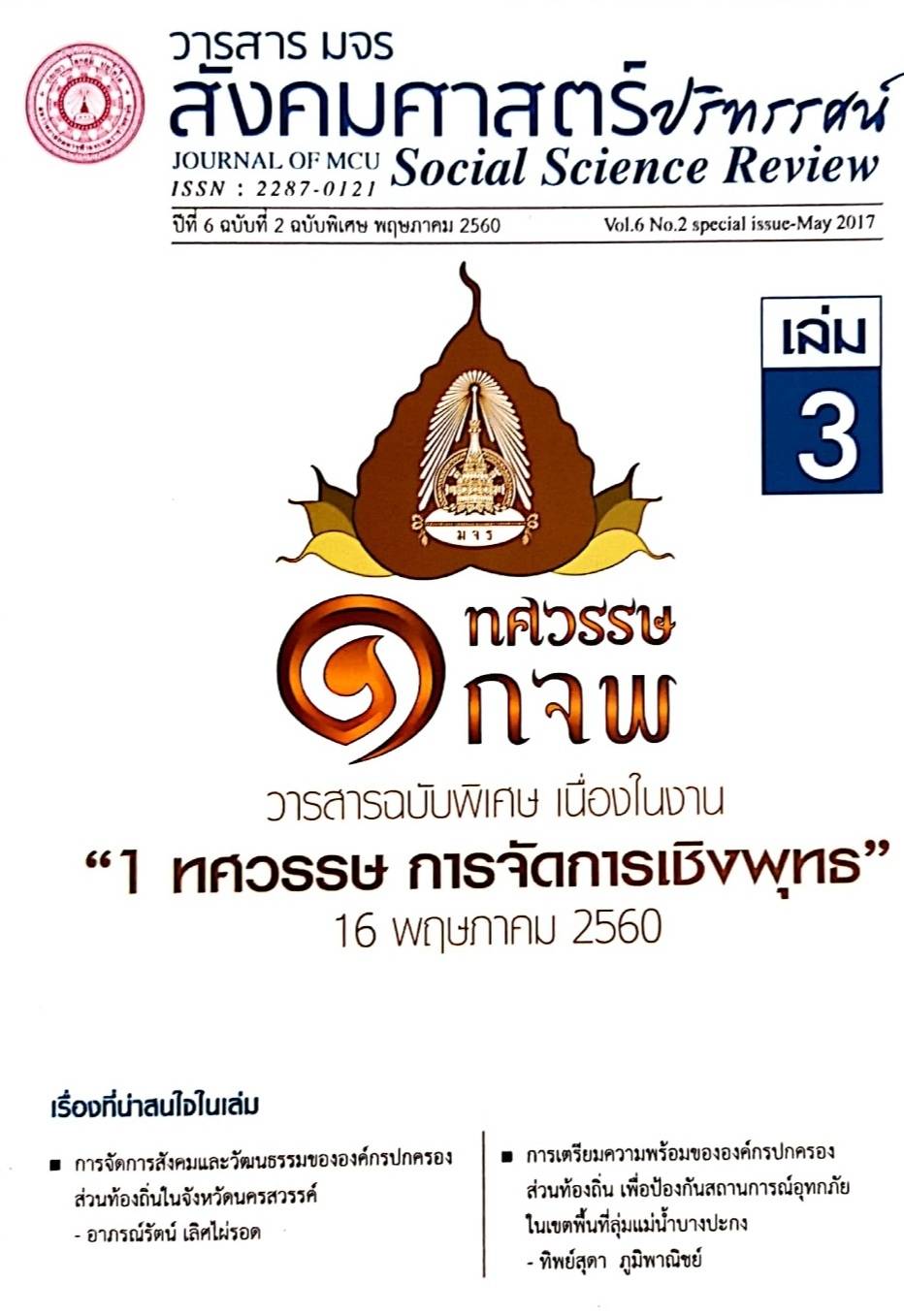รูปแบบการจัดการความปลอดภัยของอาหารที่ระบุวันหมดอายุสำหรับวัดพุทธ
คำสำคัญ:
การจัดการความปลอดภัย, อาหารที่ระบุวันหมดอายุ, วัดพุทธบทคัดย่อ
ระบบการจัดการอาหารสำเร็จรูปที่ตกค้างภายในวัดเป็นเรื่องที่จำเป็นเกี่ยวข้องกับความปลอดภัยต่อสุขภาพ การวิจัยพัฒนานี้ มีวัตถุประสงค์เพื่อสร้างรูปแบบการจัดการอาหารสำเร็จรูปที่มีฉลากระบุวันหมดอายุภายในวัดพุทธ ดำเนินการโดยการวิเคราะห์สถานการณ์ สร้างรูปแบบและตรวจสอบด้วยการสัมภาษณ์เชิงลึกและเทคนิคเดลฟาย ผู้ให้ข้อมูลสำคัญ ได้จากการประชุมกลุ่มเฉพาะ 3 กลุ่ม รวมผู้มีส่วนเกี่ยวข้องในการจัดการอาหารของพระสงฆ์ จำนวน 23 คน สัมภาษณ์เชิงลึก จากพระสงฆ์ที่มีส่วนรับผิดชอบในการจัดการอาหารภายในวัด 3 กลุ่มตามขนาดความศรัทธาจำนวน 9 รูป เก็บข้อมูลจากผู้เชี่ยวชาญที่มีประสบการณ์ตรง ด้วยเทคนิคเดลฟาย จำนวน 20 รูป/คน ใช้การวิเคราะห์สถิติด้วยค่ามัธยฐาน และค่าพิสัยรควอไทล์ และการวิเคราะห์เนื้อหา ผลการวิจัยพบว่า
1) มีอาหารหมดอายุในเกือบทุกประเภทของอาหารที่พบในวัด พบหมดอายุไปแล้ว ระหว่าง 45-2,155 วัน
2) รูปแบบการจัดการความปลอดภัยของอาหารที่ระบุวันหมดอายุ มีการบูรณาการระบบเป็น 5 รูปแบบย่อยคือ พระสงฆ์จัดการเอง ส่วนกลางของวัดจัดการ เสริมสร้างความรู้พระสงฆ์ และผู้นำอาหารมาถวายพระสงฆ์ รวมทั้งกำหนดเป็นนโยบายสาธารณะ
*1Graduate education, Doctor of Public Health Program, Faculty of Public Health, Burapha University
**2 Assc.Prof.PH.D., Faculty of Public Health, Burapha University.
***3Assc.Prof. Ph.D., Faculty of Public Health, Burapha University.
****4Ph.D., Faculty of Public Health, Burapha University.
3) รูปแบบย่อยของพระสงฆ์จัดการเอง และส่วนกลางของวัดจัดการ มี 5 ขั้นตอน คือ การคัดแยกอาหาร การจัดลำดับอาหารที่คัดแยกแล้ว การตรวจสอบอาหารหมดอายุ การแจกจ่ายอาหารที่ใกล้หมดอายุ และกำจัดอาหารที่หมดอายุแล้ว
4) รูปแบบย่อยการเสริมสร้างความรู้พระสงฆ์ และผู้นำอาหารมาถวายพระสงฆ์มี 2 ด้าน คือ ด้านเนื้อหาความรู้ และด้านรูปแบบการให้ความรู้
5) รูปแบบย่อย การกำหนดเป็นนโยบายสาธารณะโดยการ ประกาศเป็นนโยบายการจัดการความปลอดภัยของอาหารสำหรับวัด กำหนดแนวทางการจัดหาบุคคลที่เหมาะสมมารับผิดชอบการปฏิบัติตามนโยบาย และกำหนดเป็นกฎระเบียบหรือข้อบัญญัติให้ทุกวัดจัดทำมาตรการให้สอดคล้องกับคู่มือการจัดการอาหารปลอดภัยภายในวัด
ผลการวิจัยสามารถใช้เป็นแนวทางในการจัดการความปลอดภัยของอาหารที่ระบุวันหมดอายุสำหรับวัดพุทธต่าง ๆ โดยความร่วมมือของหน่วยงานภาครัฐ เอกชน และกิจการพระศาสนา จะช่วยยกระดับความปลอดภัยและผลสัมฤทธิ์ด้านต่าง ๆ ทางพุทธศาสนาได้สมบูรณ์มากยิ่งขึ้น
เอกสารอ้างอิง
European Commission. (2005). In order to evaluate the official foodstuffs control system and in particular the implementation of controls on hygiene of foodstuffs. Lithuania: Food and Veterinary Office.
Kiatkanon, K. (2016). The relationship of selected factors between Food consumption Behavior and health status among monks with non – chronic disease. Bangkok: Suan Sunandha Rajabhat University.
Lebersorfer, S., & Schneider, F. (2014). Food loss rates at the food retail, influencing factors and reasons as a basis for waste prevention measures. Waste Management, 34, 1912-1919.
Lertsuchatavanich, S., & Kengganpanich, M. (2007). Food supplement consumption behavior for weight control of public health personnel in Ratchaburi province. Journal of Health Education, 30(1), 31-44.
Martins, R.C., Lopes, V.V., Vicente, A.A., & Teixeira, J.A. (2008). Computational shelf-life dating: Complex systems approaches to food quality and safety. Food and Bioprocess Technology, 1(3), 207-222.
Ministry of Public Health, Department of Health, Bureau of Food and Water Sanitation. (2014). Food and water sanitation practices manual for public health executive. (2nd ed.). Bangkok: Thailand Agricultural Co-operative Federation Printing House.
Morton, J. (2017). A guide to color symbolism. Retrieved from http://indusvalley.edu.pk/library1/e%20books/A%20Guide%20To%20Color%20Symbolism.pdf
Phettongkam, C., Ruangsopon, T., Ruangsopon, W., Pumkuman, P., Saisud, T., Kawsang, W., & Ruangchotwit, R. (2011). Appropriate waste management technology by community participation: A case study of Raisom subdistrict administrative organization, Phetchaburi. Bangkok: Environmental Research and Training Center, Ministry of Natural Resources and Environment.
Pongnumkul, A., Saneha, C., Panithat, R., Kusuma S.,Ayuthdaya, & Sangkapong, T. (2011). Nutritional consumption behaviors of Thai monks in Bangkok-noi District, Bangkok Metropolitan Area. Journal of Nursing Science, 29(2), 37-45.
Priest Hospital. (2005). Reports on treatment statistics of the monk on the Inpatient department. [n.p.].
Rimkeeree, H., Chompreeda, P., & Jangchud, A. (2001). Consumer attitudes and behavior toward considering best before date in food product buying decision. Proceedings of the 39th Kasetsart University Annual Conference: Fisheries, Agro-Industry. Bangkok: Kasetsart University.
Srimanee, S., Muttawangkul, C., Poomrittikul, P., Janjaruan, K., Honggririt, P., & Romniikul, M. (2013). Factors related to nutrition consumption behaviors of monks and foodstuff dedication behaviors to the Buddhist monks of people in Pasi Charoen District, Bangkok. Bangkok: Thai Health Promotion Foundation.
Suksawat, P. (2013). The appropriate Buddhist offerings for the monks' useful in the present: A case study of monks in Don Chedi Subdistrict, Don Chedi District, Suphan Buri Province. (Master of Business Administration Thesis ,Silpakon University).
Thailand delegation of the European Union. (2017). New trends in food waste disposal in the European Union. Retrieved from: http://www2.thaieurope.net
ดาวน์โหลด
เผยแพร่แล้ว
รูปแบบการอ้างอิง
ฉบับ
ประเภทบทความ
สัญญาอนุญาต
ลิขสิทธิ์ (c) 2020 วารสาร มจร สังคมศาสตร์ปริทรรศน์

อนุญาตภายใต้เงื่อนไข Creative Commons Attribution-NonCommercial-NoDerivatives 4.0 International License.
เพื่อให้เป็นไปตามกฎหมายลิขสิทธิ์ ผู้นิพนธ์ทุกท่านต้องลงลายมือชื่อในแบบฟอร์มใบมอบลิขสิทธิ์บทความให้แก่วารสารฯ พร้อมกับบทความต้นฉบับที่ได้แก้ไขครั้งสุดท้าย นอกจากนี้ ผู้นิพนธ์ทุกท่านต้องยืนยันว่าบทความต้นฉบับที่ส่งมาตีพิมพ์นั้น ได้ส่งมาตีพิมพ์เฉพาะในวารสาร มจร สังคมศาสตร์ปริทรรศน์ เพียงแห่งเดียวเท่านั้น หากมีการใช้ภาพหรือตารางหรือเนื้อหาอื่นๆ ของผู้นิพนธ์อื่นที่ปรากฏในสิ่งตีพิมพ์อื่นมาแล้ว ผู้นิพนธ์ต้องขออนุญาตเจ้าของลิขสิทธิ์ก่อน พร้อมทั้งแสดงหนังสือที่ได้รับการยินยอมต่อบรรณาธิการ ก่อนที่บทความจะได้รับการตีพิมพ์ หากไม่เป็นไปตามข้อกำหนดเบื้องต้น ทางวารสารจะถอดบทความของท่านออกโดยไม่มีข้อยกเว้นใดๆ ทั้งสิ้น





